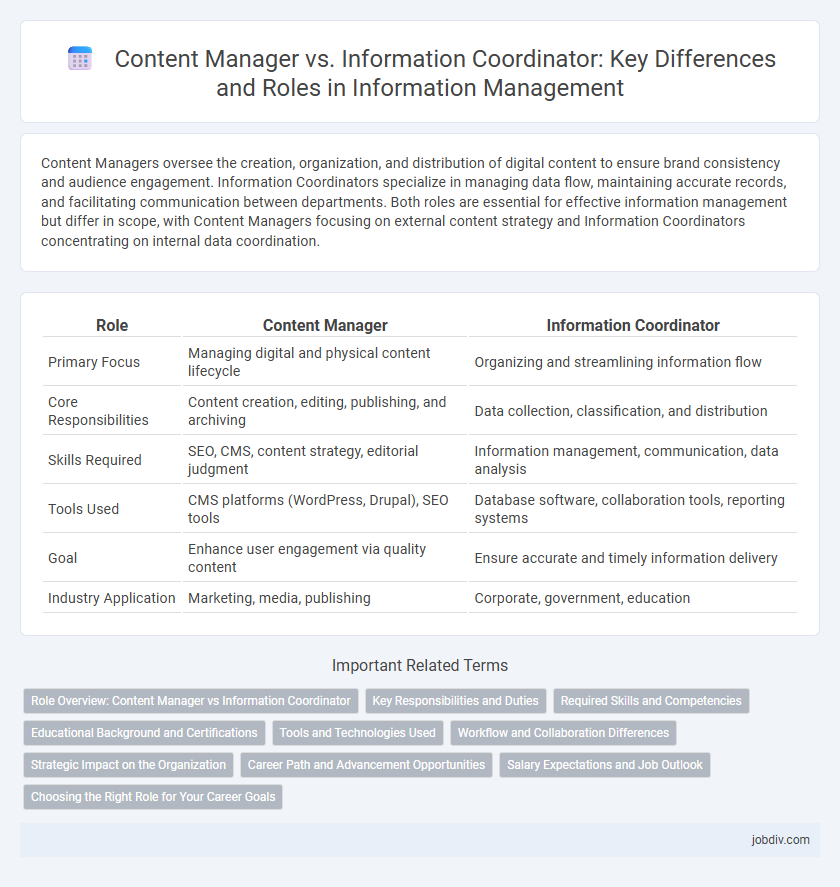Content Managers oversee the creation, organization, and distribution of digital content to ensure brand consistency and audience engagement. Information Coordinators specialize in managing data flow, maintaining accurate records, and facilitating communication between departments. Both roles are essential for effective information management but differ in scope, with Content Managers focusing on external content strategy and Information Coordinators concentrating on internal data coordination.
Table of Comparison
| Role | Content Manager | Information Coordinator |
|---|---|---|
| Primary Focus | Managing digital and physical content lifecycle | Organizing and streamlining information flow |
| Core Responsibilities | Content creation, editing, publishing, and archiving | Data collection, classification, and distribution |
| Skills Required | SEO, CMS, content strategy, editorial judgment | Information management, communication, data analysis |
| Tools Used | CMS platforms (WordPress, Drupal), SEO tools | Database software, collaboration tools, reporting systems |
| Goal | Enhance user engagement via quality content | Ensure accurate and timely information delivery |
| Industry Application | Marketing, media, publishing | Corporate, government, education |
Role Overview: Content Manager vs Information Coordinator
Content Managers oversee the creation, organization, and strategy of digital content to enhance brand presence and audience engagement across platforms. Information Coordinators focus on collecting, managing, and distributing data and information within organizations to ensure accuracy and accessibility for decision-making. Both roles require strong organizational skills, but Content Managers emphasize content strategy and creativity, while Information Coordinators prioritize information flow and data integrity.
Key Responsibilities and Duties
Content Managers oversee the creation, editing, and publication of digital content to ensure consistency and brand alignment, managing content calendars and coordinating with marketing teams to optimize audience engagement. Information Coordinators focus on organizing, categorizing, and maintaining data accuracy within information systems, facilitating efficient information flow and accessibility for internal stakeholders. Both roles require strong communication skills, but Content Managers emphasize strategic content development while Information Coordinators prioritize data management and information dissemination.
Required Skills and Competencies
Content Managers require strong expertise in digital content strategy, SEO optimization, and content management systems (CMS) like WordPress or Drupal, along with excellent editorial skills and project management capabilities. Information Coordinators prioritize proficiency in data organization, metadata management, information taxonomy, and familiarity with knowledge management systems to ensure accurate data flow and retrieval. Both roles demand effective communication, analytical thinking, and the ability to collaborate cross-functionally to optimize information dissemination and usability.
Educational Background and Certifications
Content Managers typically hold degrees in Communications, Marketing, or Journalism and often pursue certifications like Certified Content Marketing Specialist (CCMS) to enhance their expertise. Information Coordinators usually possess educational backgrounds in Library Science, Information Management, or Data Science, coupled with certifications such as Certified Information Professional (CIP) or Project Management Professional (PMP). These specialized academic credentials and certifications are crucial for mastering content strategy and data organization within their respective roles.
Tools and Technologies Used
Content Managers primarily use content management systems (CMS) like WordPress, Drupal, and HubSpot to create, organize, and publish digital content, while leveraging analytics tools such as Google Analytics and SEMrush for performance tracking and SEO optimization. Information Coordinators rely on database management software like Microsoft Access and SQL-based systems, along with document management tools like SharePoint and Evernote, to ensure accurate data organization and accessible information flow. Both roles increasingly integrate collaboration platforms such as Slack, Trello, and Microsoft Teams to streamline communication and project management.
Workflow and Collaboration Differences
Content Managers oversee the creation, publication, and maintenance of digital assets, ensuring brand consistency and content quality across multiple platforms. Information Coordinators organize, classify, and manage data flow within organizations to enhance accessibility and support decision-making processes. Workflow for Content Managers centers on editorial calendars and stakeholder collaboration, while Information Coordinators focus on information architecture and interdepartmental data exchanges.
Strategic Impact on the Organization
Content Managers drive organizational growth by developing and executing content strategies that enhance brand visibility and engage target audiences, directly influencing market positioning and revenue streams. Information Coordinators optimize data flow and ensure accurate information dissemination, improving decision-making efficiency and operational alignment within teams. Both roles strategically impact the organization by balancing creative content management and structured information coordination to support overall business objectives.
Career Path and Advancement Opportunities
Content Managers typically advance by developing expertise in digital marketing and project management, often progressing to senior roles such as Digital Content Director or Chief Content Officer. Information Coordinators generally move into positions with increased responsibility in data governance or information strategy, such as Information Manager or Records Management Officer. Both career paths benefit from continuous learning in technology trends and organizational communication to unlock leadership opportunities.
Salary Expectations and Job Outlook
Content Managers typically earn an average salary ranging from $60,000 to $90,000 annually, reflecting their strategic role in overseeing content creation and distribution. Information Coordinators usually have a salary range of $45,000 to $65,000, aligning with their focus on organizing and managing information resources. Job outlook for Content Managers shows a 10% growth due to increasing digital marketing demands, while Information Coordinators experience a steadier 5% growth influenced by organizational information management needs.
Choosing the Right Role for Your Career Goals
Choosing the right role between Content Manager and Information Coordinator depends on your career goals, as Content Managers focus on strategizing, creating, and overseeing digital content to engage audiences, while Information Coordinators specialize in organizing, managing, and distributing data to ensure efficient information flow. Content Managers often require skills in content marketing, SEO, and project management, whereas Information Coordinators emphasize data management, information systems, and communication protocols. Understanding the distinct responsibilities and required competencies of each role helps align your career path with industry demands and personal strengths.
Content Manager vs Information Coordinator Infographic

 jobdiv.com
jobdiv.com